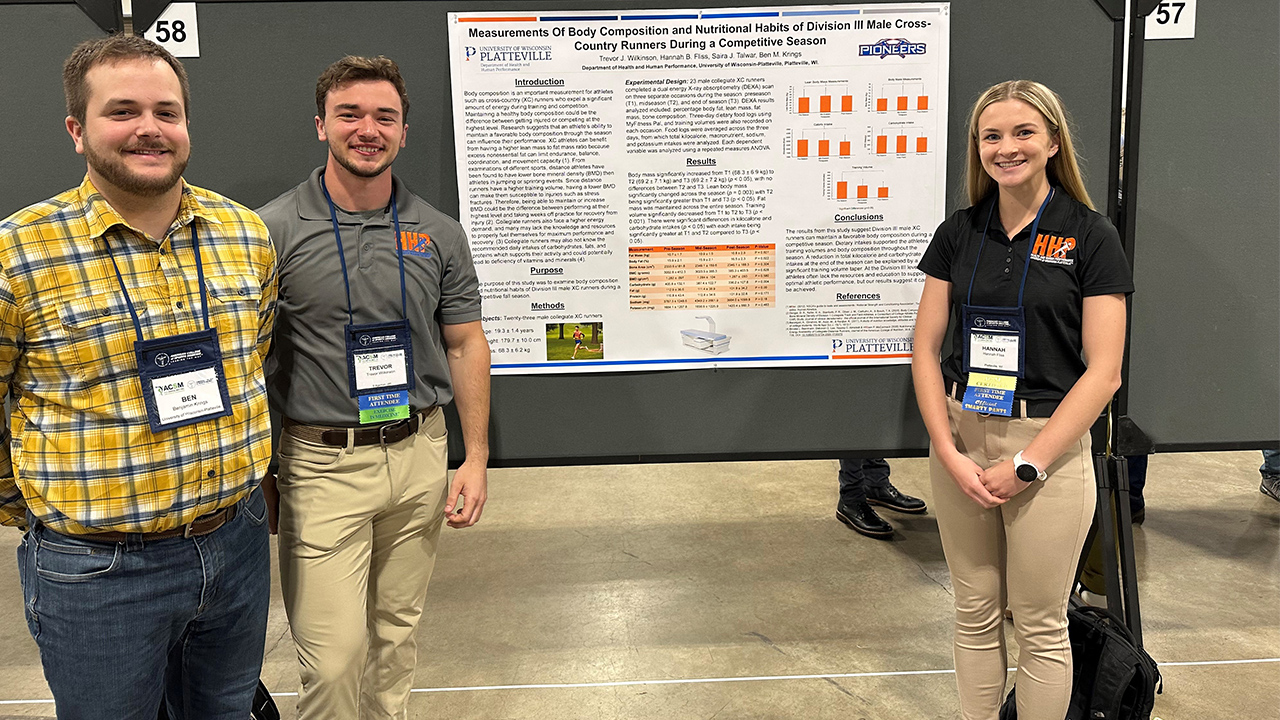
Two University of Wisconsin-Platteville health and human performance students, Trevor Wilkinson and Hannah Fliss, recently presented their research through poster presentations at the National American College of Sports Medicine Conference in Denver, Colorado.
Both Wilkinson and Fliss agreed that presenting at the conference was an incredible experience.
“As an undergraduate, this conference provided immense opportunities for personal and professional growth,” said Fliss, from Mosinee, Wisconsin. “Through this presentation, I met experts in the health and wellness field that listened to my research and also provided incredible feedback.”
“It was a real eye-opener to see where our majors could lead us,” added Wilkinson, from Edgerton, Wisconsin. “Events like this really get you excited and motivated to tackle more projects and share them with people.”
Both students presented research on the body composition and nutrition habits of Division III cross-country runners over a competitive season. Fliss’ research focused on females while Wilkinson’s research focused on males. Both noted that maintaining a healthy body composition is essential to the performance of athletes within endurance sports, such as cross-country.
Fliss said she chose this topic, because body composition for runners, specifically females, can be difficult to address. Her goal was to find out if female athletes eat enough to maintain favorable body composition for the number of miles they run. Wilkinson added that college athletes may struggle with a lack of food resources which could lead to a lack of quality food to fuel their performance, and that failure to fuel oneself properly while maintaining a healthy body composition may lead to deficiency, fatigue and could result in injury.
“It wasn’t just learning about cool new facts and scientific research, we gained resources and made contacts that may benefit us in the future in school or research projects,” said Wilkinson on attending the conference. “Talking to industry professionals and immersing ourselves in the environment allowed us to gain so much more from participating in the conference.”
Krings expressed gratitude, on behalf of himself, Fliss and Wilkinson, toward the Office of Research and Sponsored Programs at UW-Platteville for funding their trip to the conference through travel grants.
“It is rare for undergraduates to present research at this national conference, as it’s primarily graduate students,” said Dr. Ben Krings, assistant professor and program chair of exercise science and human performance.
“Many of the people I spoke to while presenting asked if I was a Ph.D. student and were shocked when I told them I was an undergraduate student,” said Fliss. “Everyone there was thrilled to see us there getting involved early and were eager to talk to us about future opportunities for graduate schools and careers.”
According to its website, the American College of Sports Medicine advances and integrates scientific research to provide educational and practical applications of exercise science and sports medicine to help people worldwide live longer, healthier lives and leads the way in sports medicine, representing 70 sports medicine professions with more than 50,000 members and certified professional from 90 countries.